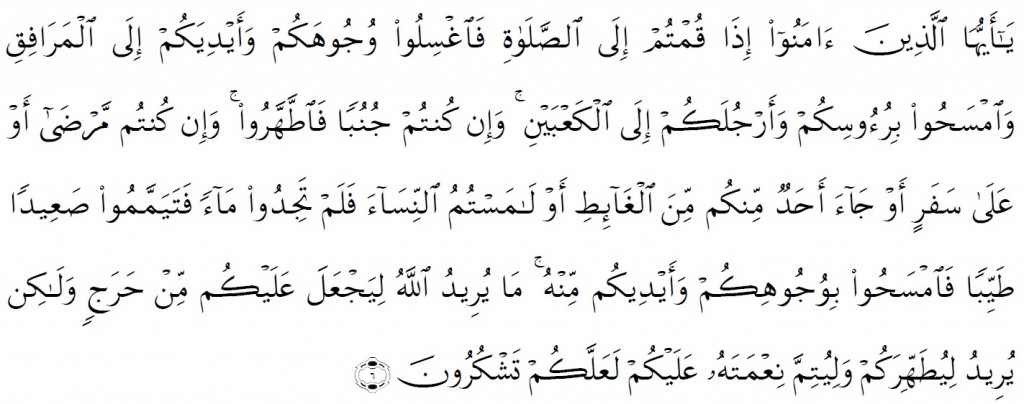Download .pdf
The legality of wiping the khuff in wudu’
“Jarir bin ‘Abdullah [ra] urinated then he performed wudu’ and wiped over his khuff. It was said, ‘Do you do that?’ He said, ‘Yes. I saw the Messenger of Allah [saws] urinate then he performed wudu’ and wiped over his khuff.’” Ibrahim [ra] said, “They were impressed by this hadith because Jarir accepted Islam after surah Al-Ma’idah was revealed.”[1]
Surah Al-Ma’idah Chapter 5 Verse 6
O you who believe! When you intend to offer the prayer wash your faces and your hands up to the elbows rub [by passing wet hands over] your heads and [wash] your feet up to the ankles. If you are in a state of janabah [after sexual discharge] purify yourselves [bathe your whole body]. But if you are ill or on a journey or any of you come after answering the call of nature or you have been in contact with women [sexual intercourse] and you find no water then perform tayammum with clean earth and rub therewith your faces and hands. Allah does not want to place you and to complete His Favour to you that you may be thankful.[2]
To wear the khuff only after wudu’
“I was with the Prophet [saws] one night on a journey and he said to me, ‘Do you have any water with you?’ I said, ‘Yes.’ He got down from his mount and walked until he disappeared in the blackness of the night. Then he came back, and I poured water for him from that vessel, and he washed his face. He was wearing a wool cloak and he could not bring his arms out of it so he brought them out from beneath the cloak then he washed his arms and wiped his head. Then I bent down to take off his khuff, and he said, ‘Leave them for I put them on while my two feet were tahir [clean or pure]’ and he wiped over them.”[1]
To wipe over the khuff up to three days and nights for the traveller and one day and night for the resident
“I came to ‘A’ishah [ra] and asked her about wiping over the khuff. She said, ‘You should go to [‘Ali] ibn Abi Talib [ra] and ask him for he used to travel with the Messenger of Allah [saws].’So we asked him and he said, ‘The Messenger of Allah set a limit of three days and their nights [three nights] for the traveller and one day and one night for one who is not travelling.’”[2]
To wipe over the top of the khuff, not the bottom
“I saw the Prophet [saws] wiping over the khuff: on the tops of them.”[3]
To remove khuff when required to perform ghusl
“I asked Safwan bin ‘Assal [ra] about wiping over khuffs and he said, ‘The Messenger of Allah [saws] used to tell us when we were travelling to wipe over our khuffs and not take them off for three nights in the event of defecating, urinating or sleeping; only in the case of janabah.’”[4]
[1] Sahih Muslim 631 [79/274]; Sunan Abu Dawud Sahih 151; Sahih Al-Bukhari 206
[2] Sahih Muslim 639 [85/276]; Sunan An-Nasa’i Sahih 129; Sunan Ibn Majah Sahih 552
[3] Jami’ At-Tirmidhi Hasan 98; Sunan Abu Dawud Hasan 161
[4] Sunan An-Nasa’i Hasan 127
